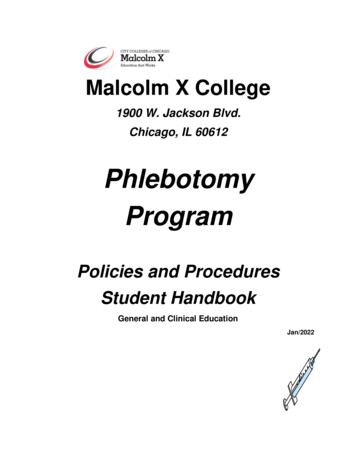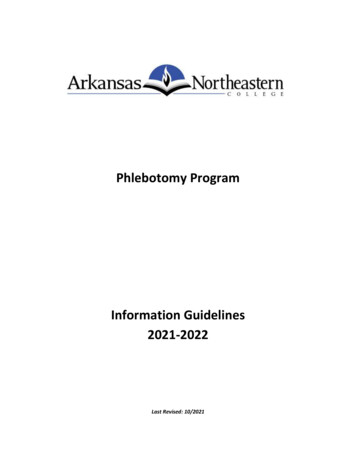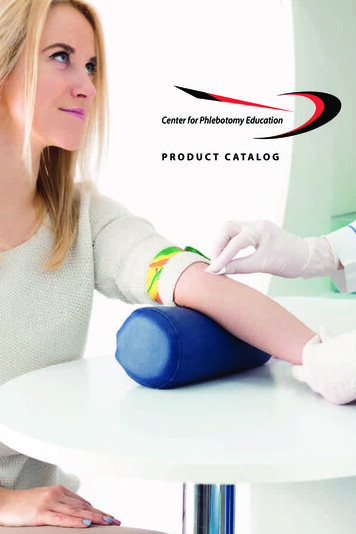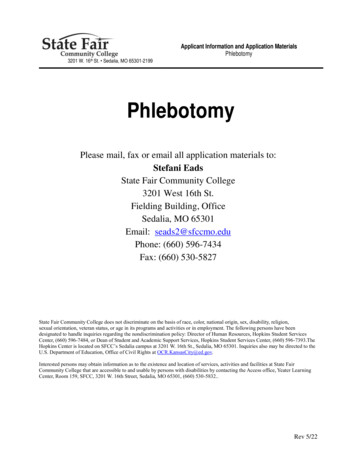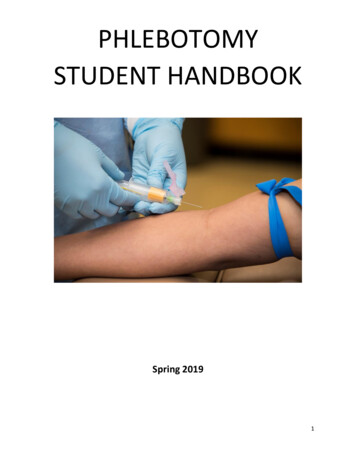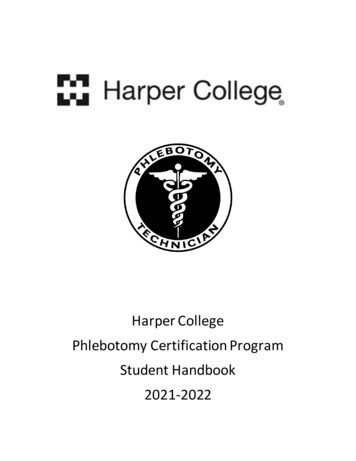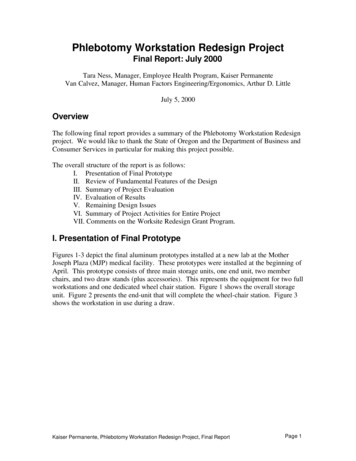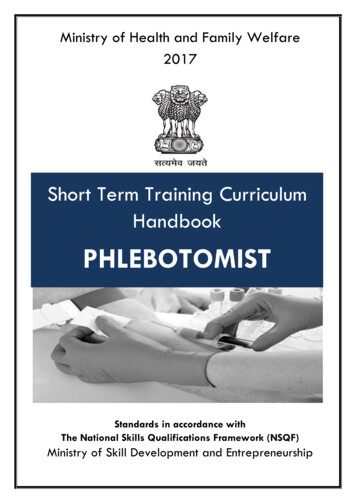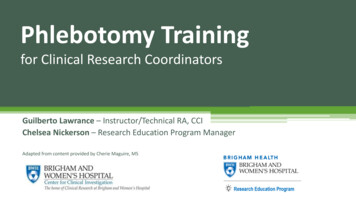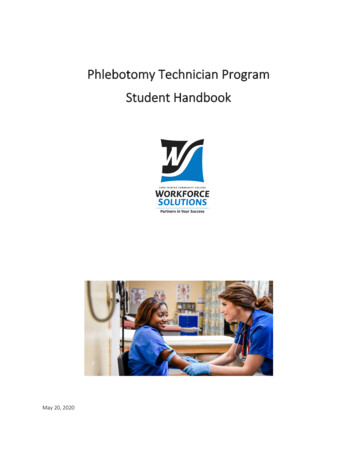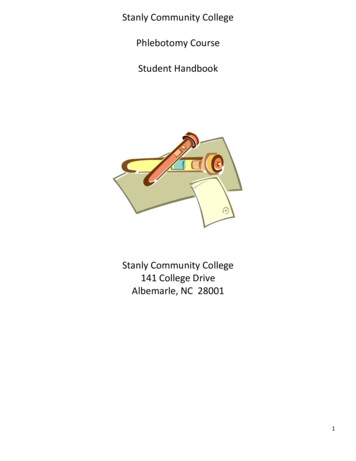
Transcription
Stanly Community CollegePhlebotomy CourseStudent HandbookStanly Community College141 College DriveAlbemarle, NC 280011
Phlebotomy Course Mission StatementThe Phlebotomy Course at Stanly Community College (SCC) is a certificate course that prepares individualswith the skills and knowledge needed to obtain blood specimens for the purpose of laboratory analysis. TheSCC Phlebotomy course will provide a quality and diverse education while maintaining high standards ofinstruction and delivery. Instruction will be accomplished in a professional environment that includes lecture,lab, and clinical experiences.Phlebotomy Course Objectives:1. Prepare students to have entry level knowledge of phlebotomy and healthcare.2. Prepare students to serve as quality employees for the healthcare community.3. Prepare students to successfully pass national certification exams.General InformationThe SCC Phlebotomy course is a 192 hour certificate course (72 hours classroom and 120 clinical hours)Admission RequirementsIn order to be considered for admissions to the Stanly Community College Phlebotomy course, applicantsmust:1. Submit proof of US High School Diploma or GED completion or an evaluated non-US High SchoolDiploma and Reading Assessment at 10th grade reading level.2. Direct patient care experience or training.After being accepted into the Phlebotomy course students will be required to submit:1. Copy of Driver’s License2. Medical Form demonstrating current immunizations and PPD3. Criminal background Check4. Drug ScreenCriteria to receive a CertificateStudents must meet all class and clinical requirements in order to obtain a certificate for the phlebotomycourse.Phlebotomy Certification ExaminationsStudents who complete the Phlebotomy Program at Stanly Community College are encouraged to take a nationalcertification examination for phlebotomy technicians. Certification represents the recognition of someone who has metall of the required qualifications specified by the certifying agency or association.2
Grading PolicyStudent will receive an “S” (Satisfactory) if they adhere to the attendance requirements, and they obtain aquiz/test/homework combined score of 75 or above. In addition, Students must also satisfactorily complete afinal check off at the end of the course to receive a “Satisfactory” grade. Students will receive a “U” indicatingachievement is Unsatisfactory if they do not adhere to the attendance requirements or if theirquiz/test/homework average is 74 or less.Class AttendanceClass attendance is an integral part of the learning process, and each student is expected to attend all classesfor which he or she is registered. Absences do not relieve the student’s responsibility of meeting therequirements of the class. Students may be withdrawn by the instructor if class requirements are not beingmet.Students must attend at least 60 of the 72 hours of classroom meeting in order to receive a certificate. Inother words, missing more than 12 hours of the classroom portion of the course will result in an“Unsatisfactory” grade. Any assignment missed must be made up on the student’s own time.A tardy will be recorded when students are 30 minutes or more late. This includes tardiness at the beginningof class and when returning from breaks. Two tardies will be recorded as 1 class absence (remember studentsare only allowed 2 class absences). Any absence beyond this will result in a course grade of Unsatisfactory anddismissal from the course.Any time missed by a student due to leaving the classroom prior to class end will also be recorded anddeducted from the student’s attendance record.Although there is no written dress code for classroom attendance, students are expected to exhibit a neat,tasteful appearance.Classroom Policies1. No cell phones are allowed in class. Students must attend to all outgoing and incoming calls, texts,emails, etc. during breaks.2. No food is allowed in the classroom.3. The instructor reserves the right to dismiss any student from the classroom for the day due to behaviorthat is disruptive to learning. This may include but is not limited to:a. Cell phone usageb. Disruptive conversationc. Combative behaviord. Dangerous behaviors during lab** Time missed due to dismissal will be deducted from the student’s attendance record **3
Clinical AttendanceA student must not miss more than 2 scheduled clinical days without a statement from a physician. All clinicaltime that is missed due to absences must be made up. It is the responsibility of the student to arrange allmake up time with his/her preceptor to ensure that all 120 hours are completed. Students must complete 120hours of clinical and the required number of sticks in order to receive a certificate of completion. Studentsmust keep up with their clinical hours on the Phlebotomy Time Sheet.Clinical PoliciesThe SCC Phlebotomy course provides classroom and laboratory learning opportunities to develop competenciesrequired of a phlebotomist prior to being placed in a clinical rotation. After being placed in a clinical setting, clinicalfaculty will participate in evaluations of the student.Each student is required to complete a total of 100 venipunctures and 25 skin punctures and observe (if available) 5arterial punctures. Students must also complete 120 hours of clinical study with an approved preceptor.General Conduct Respect all patients’ privacy and confidentiality. Do not discuss patients where others may hear your conversation. Report away from the patients’ bedside. Obscene or profane language will not be tolerated in the clinical area. Do not use inappropriate or offensive commentary or body language toward others.No personal calls or personal visits are allowed in the clinical setting, except in emergency situations.The ability of students to meet clinical objectives, demonstrate phlebotomist competencies, and maintain patient/clientsafety is required to receive a passing grade. If a student is unable to meet these criteria, they may be dismissed fromthe course and will receive a grade of Unsatisfactory for the course.All students will be responsible for keeping their time recorded on the time sheet provided. Once the student arrives tothe clinical site, they must put the time they arrived and have it signed by their Preceptor. At the end of the clinical day,the student must put the time they leave clinical and have it signed by their Preceptor.Students will treat clinical assignments with respect: reporting to the facility on time, in professional dress and attitude.Preceptors have the right to dismiss a student from clinical.Must adhere to HIPPA (privacy) rules and regulations. Do not take pictures, use social media, or discuss clinical settingoutside of class.Clinical CompetenciesEach student will be required to complete a total of 100 venipunctures and 25 skin punctures and observe (if available) 5arterial punctures. Each successful competency must be documented on the Phlebotomy Progress Sheet form andsigned by the preceptor witnessing the procedure.Clinical Dress Code and AppearanceProfessional appearance and appropriate attire are important attributes for anyone in the medical profession. Studentswill be required to purchase white uniforms for clinical rotations (see attached uniform policy).4
Identification BadgesStudents must be clearly identified as such in every clinical setting to distinguish them from clinical site employees andother health profession students.Photo identification badges will be made and issued by SCC for students to wear in all clinical settings. These may beobtained at Eagle’s One Stop on the Albemarle campus. You must present your Student ID number and 2 to obtain anID badge.Clinical ScheduleA clinical schedule will be compiled on or before the last week of classroom work. However, once the schedule is made,the student must adhere to it. The instructor and coordinator make every effort to accommodate the preferred clinicallocation of the student, but it is up to the student to adjust his/her schedule around his/her clinical assignment. If astudent is rejected by his/her assigned clinical site due to criminal background check and/or drug screen results, thestudent will not be assigned an alternative clinical and will therefore receive a grade of Unsatisfactory for the course.Criminal Background Check and Drug ScreenClinical affiliates may require all students that participate in clinical activities and patient care at their facility have acriminal background check and drug screening prior to clinical rotations. This mandate is a recommendation from theJoint Commission on Accreditation of Healthcare Organizations. To fulfill contractual agreements with clinical affiliates,Phlebotomy Students are required to submit an official criminal record check and drug screening prior to participating inclinical rotations.Each clinical affiliate has the right to deny any student access for clinical rotations based upon criminal background ordrug screen results. This denial would result in the student’s inability to complete the Phlebotomy course andsubsequently, the student would receive an “Unsatisfactory” grade for the course.Students are under a continuing obligation to report any allegations or charges of a misdemeanor(s) or felony(s) thatoccur after the criminal background check has been originally submitted. Failure to provide updated or correctedinformation in a timely manner may be cause for removal from a clinical facility and from the phlebotomy course.Criminal record checks and drug screening shall be at the student’s expense. Failure for the student to comply with thispolicy will result in the student not being allowed to progress in this program.Student ResourcesThe phlebotomy classroom and lab is EB 104. A good deal of equipment is housed in this room that will be utilized withthe multiple courses that SCC offers. If you are unfamiliar with the equipment and have not covered it in class, pleasedo not experiment with it. It is up to the students and faculty to ensure the classroom and equipment is maintained inproper order. If you are aware of any equipment that is not in proper working order, please report it immediately to thefaculty. Equipment or chemicals should not be removed from the classroom without permission of the instructor.Students will have a central area on the SCC webpage called Student Resources to get to services that students useevery day. From this portal page, students will be just a click away from the email account, the library, grades, online5
classes, and more. The Student Resources page will be an easy, convenient way to navigate to various collegeinformation and announcements. Students will find links to the following:1. Student Email Accounts: All students have an SCC email account.2. WebAdvisor: WebAdvisor is a very important resource available to students. Students are able to view grades,request a transcript of their grades, etc. Students may also register for the courses online through WebAdvisor.3. College-wide Online Help Desk: This feature is a one-stop center where your questions can be directed quicklyand efficiently. Ask questions about financial aid, registration, technical support for online classes and more.Your questions will be answered by Help Desk personnel or directed to an appropriate area of the college.The Library at SCC, located in the Snyder building, has various materials related to phlebotomy and other health careareas. In addition, Internet access is available in the library and in the Student Success Center located in the WebbCenter.Liability InsuranceAll students are required to purchase liability (malpractice) insurance for protection in the event of a liability claim of apersonal or profession nature resulting from the performance of clinical duties. This fee will be collected with thecourse fee. Students will not be allowed to participate in clinical activities until this fee is paid in full.Clinical Facility OrientationsClinical affiliates may require orientation sessions or modules. Each student will be responsible for completingorientations as necessary. The student will be held accountable for policies and procedures discussed for each clinicalfacility.6
Student Grievance PolicyApproved By and Date:Board of Trustees12-12-2013Executive Leadership Team11-04-2013ICORE10-30-2013Stanly Community College recognizes the importance of a prompt and efficient resolution process forboth academic as well as non-academic student grievances. The primary objective is to ensure thatstudents have the opportunity to present grievances to the College regarding a certain action orinaction by a member of the college community and that the College has a consistent way of resolvingthose grievances in a fair and just manner.Student Grievance ProceduresApproved By and Date:Executive Leadership Team09-21-2015ICORE09-09-2015This policy will apply to grievances that are not governed by other specific grievance procedures such asbut not limited to Title IX.Informal Resolution. Prior to taking formal action, the student is strongly encouraged, but is notrequired to discuss his or her grievance with the person alleged to have caused the griev ance. Thediscussion should be held as soon as the student first becomes aware of the act or condition that is thebasis of the grievance. As an alternative, the student may wish to present his or her grievance in writingto the person alleged to have caused the grievance. In either case, the person alleged to have causedthe grievance must respond to the student within five (5) school days for non -academic grievances orthree (3) days for final grade appeals, either verbally or in writing.Formal Resolution. If a student decides not to present his or her grievance to the person alleged to havecaused the grievance or if the student is not satisfied with the response, he or she may present thegrievance in writing, by completing the Student Appeals Form, to the administrator of the departmentor area where the person alleged to have caused the grievance is employed. Any such written grievancemust be received by the administrator no later than five (5) school days after the student first becameaware of the facts which gave rise to the grievance. Final grade appeals will be subject to a three (3)school day submission period. The student will be assigned a counselor to serve as an advocate and toprovide support during the grievance process. The student will be supplied with the counselor’s nameand contact information upon submission of the grievance. The administrator will conduct aninvestigation as warranted to resolve any factual disputes. Based upon the investigation, theadministrator shall make a determination and submit his/her decision in writing to the student and tothe person alleged to have caused the grievance within five (5) school days of receipt of the writtengrievance. Final grade appeals will be subject to a three (3) school day response period.7
Appeal Procedure. Within three (3) school days of receipt of the administrator’s decision, a student who is not satisfiedwith the response of the administrator after the initial review may pursue further review by submitting the originalwritten grievance (Student Appeals Form), together with the administrator’s written decision, to the Dean of Students.The Dean of Students may delegate another administrator to act on his/her behalf i.e. the Assistant Dean of Studentsand Career Placement). The Dean of Students may direct that further facts be gathered or that additional remedialaction be taken. Within five (5) school days (5 days for final grade appeals) of receipt of the appeal, the Dean ofStudents shall submit his/her decision in writing to the student and to the person alleged to have caused thegrievance. The written disposition shall include the reasons for the decision. The Dean of Students’ decision will befinal.Time Limits. If the student fails to meet the time limits at any step the grievance is automatically considered dropped. Ifcollege personnel, at any step, fail to meet the time limits, the grievance will be automatically advanced to the next step.Please note that the time associated with the student appeals process may hinder progression into the followingsemester in certain types of academic programs.STUDENT GRIEVANCE PROCEDURE CHARTInformal ResolutionNon-Academic GrievanceFinal Grade AppealStudent is encouraged to discuss his or her grievance with the person alleged tohave caused the grievance or the student may present his or her grievance inwriting to the person alleged to have caused the grievance.5 School Days3 School DaysIn either case, the person alleged to have caused the grievance must respond tothe student verbally or in writing.5 School Days3 School DaysFormal ResolutionStudent must submit grievance and use the Student Grievance and Grade AppealsForm.5 School Days3 School Days8
Appropriate administrator will investigate, and send a written decision to thestudent and person alleged to have caused the grievance.5 School Days3 School DaysIf unresolved, an appeal will be sent to the Dean of Students. The original StudentGrievance and Grade Appeals Form and written decision from appropriatesupervisor will be forwarded as well. The Dean of Students may direct that furtherfacts be gathered or additional remedial action be taken.3 School Days3 School DaysThe Dean of Students may delegate this appeal to another administrator. Theadministrator will send a written decision to the student and person alleged tohave caused the grievance. The written disposition shall include the reasons for thedecision and the decision from this level will be final.5 School Days5 School DaysStudent can access grievance policy by going on www.stanly.edu then click on currentstudents, policies, and find student grievance policy. There is a link provided there for thestudent appeals form.9
Viral Hepatitis B Info SheetWhat is Hep B?Hepatitis B is caused by a virus that attacks the liver. The virus, which is called hepatitis B virus (HBV),can cause lifelong infection, cirrhosis (scarring) of the liver, liver cancer, liver failure, and death.How is HBV spread?It is spread when blood from an infected person enters the body of a person who is not infected. Forexample, HBV is spread through having unprotected sex with an infected person, sharing drugs, needles,toothbrushes, razors, or through needle sticks or sharps exposures on the job, or from an infectedmother to her baby during birth.What are the symptoms?Sometimes a person with HBV infection has no symptoms at all. The older you are the more apt you areto have symptoms. You might be infected with HBV and not know it but still be contagious.The symptoms are:Yellow skin or yellowing of the whites of your eyesTiredness (Fatigue)Loss of appetiteNauseaAbdominal discomfortDark urineClay-colored bowel movementJoint painWho should get vaccinated?All babies at birthAll children 0-18 years of age who have not been vaccinatedPeople of any age whose behavior or job puts them at risk for HBV infectionAre the HepB vaccines safe?Yes. They have been shown to be safe when administered to both adults and children. Over 4 millionadults have been vaccinated in the US, and at least that many children have received hepB vaccineworldwide.What are the risk factors for HepB? Having unprotected sex with an infected person Having unprotected sex with more than one partner Using IV drugs/sharing needles A male having unprotected sex with another male Living in the same house with someone who has chronic HBV infection Having a job that involves contact with human blood and body fluids Having hemophilia10
Inclement WeatherDuring periods of inclement weather, Stanly Community College will close when conditions arehazardous. When the College is closed due to adverse weather, all extracurricular activities willbe canceled.If the College is closed or operating on a delayed schedule due to inclement weather, studentscan hear a recorded announcement by calling 704-982-0121 (Alb) or 704-888-8848 (CFC).Students may monitor the college’s website www.stanly.eduThe website’s main page banner will announce closings and/or delayed schedules.Students may also monitor the media outlets listed below to determine if the college is closedor operating on a delayed schedule.No announcement means that the college is operating on a normal schedule.RADIOWZKY 1580 AMWSPC 101 AMWJRM 1390 AMWBT 1110 AMWLNK 107.9 FMWIXE 1190 AMWLYT 102.9 FMWKKT 96.9 FMWRFX 99.7 FMWMMG 96.1 FMWEND 106.5 FMWPEG 97.9 FMWBAV 101.9 FMWSAT 1280 AMWSTP 1490 AMTELEVISIONWBTV- Channel 3NEWS 14 CAROLINA- Channel 14WCCB- Channel 18WCNC- Channel 36 7 Cable 6WFMY- Channel 2WGH PIEDMONT- FOX 8 GreensboroWSOC –Channel 911
STANLY COMMUNITY COLLEGEBLOODBORNE PATHOGEN EXPOSURE PROTOCOLPHLEBOTOMYWhat to do if I receive exposure to blood or body fluids during class exercises or clinicalrotations?Please follow the step-by-step procedure outline below if you receive exposure to blood orbody fluids while you are completing the Phlebotomy Program requirements:1) Inform your supervisor immediately At a clinical site: this is your preceptor or whoever is supervising yourperformance of venipuncture sand skin punctures the day of the incident In the classroom: this is your instructor2) If you are at a clinical site: follow the guidelines of the medical office or hospital wherethe incident occurred. This may include filling out that agency’s incident report. Yourpreceptor should advise you of the medical treatment you need to seek. You may opt toreceive this treatment at the clinical site, from your own doctor, or from an emergencycare clinic. Be sure to keep copies of all charges incurred.3) Notify the Program Coordinator, Dana Craven, of incident for further instructions.Dana Craven, RN, MSNEddins Bldg. RM 111-CStanly Community College141 College DriveAlbemarle, NC 28001704-991-0342dcraven5309@stanly.eduNOTE: Be sure that you take any bloodborne pathogen exposure seriously. You shouldcomplete all of the recommended follow-up treatment without exception.12
Stanly Community CollegePhlebotomy ProgramCriminal Background Check and Urine Drug ScreenAll SCC phlebotomy students who will attend clinicals as part of their program curriculum will be required tocomplete and pass a state-wide criminal background check and a urine drug screen. Your instructor willprovide you with the necessary forms and appropriate deadlines on the first day of class. The drug screen willbe conducted on the campus where you are attending class and, to the best of our ability, will be conductedduring class hours. Any student unable to make the scheduled screening time, will be required to drive to theoffice of Jeskri Associates to complete their test within 24 hours after the scheduled testing date. Any studentfailing to follow this instruction will be dropped from the program. If you have attended a previous class thatrequired you to have a CBC done and it has been 6 months or less, you will not be required to pay for a secondCBC for this class. The instructor will have a form for you to complete that will allow Mr. Allen to pull yourprevious results. Any questions regarding the CBC and/or UDS may be directed to Dana at 704-991-0342.Cost:Criminal Background Check: 40 money order if you have lived in NC for the past 7 years; 50 money order if you have lived outside NC at any point in thepast 7 years. 10 money order if you have had a CBC completed within the past 6 months atSCC.***This payment MUST be in a money order format. Personal checks and cash will not be accepted.Money orders should be made out to Allen’s Professional Investigations. ***Urine Drug Screen: 35 cash, check or separate money order. Must present a photo ID at thetime of the screening.***The CBC and UDS are conducted by two different companies so separate payments are required**Addresses of Jeskri AssociatesMonroe Office1821 Rocky River Road NorthMonroe, NC 28110(704) 291-9991Office Hours: 8am-4:30pmWadesboro Office217 Leak AvenueWadesboro, NC 28170(704) 695-9171Office Hours: 9am-4pm13
Cell Phone Usage Policy1. All cell phones will be silenced (not put on vibrate) during class and clinical and will be kept out of sight.2. Making or receiving phone calls, texting, using social media, taking photos, and checking the phone will notbe conducted during class or clinical time.3. All phone usage will only be conducted during break times and outside the classroom or clinical site.4. In case of a family emergency during class or clinical time, the instructor will be made aware of thesituation by the student at the beginning of the class or clinical. At the discretion of the instructor, the studentmay be allowed to leave the phone on vibrate and respond to the call when it comes by taking the phone calloutside of the classroom or clinical area. Students may also give the clinical site’s telephone number as amethod of contact in the case of an emergency.5. Students caught using a cell phone and/or having a cell phone visible during class or clinical hours will bedisciplined appropriately.Signing the Receipt of Handbook form serves as acknowledgement and understandingof this policy and serves as the student’s verbal warning. Further infractions of thispolicy will result in further disciplinary action, up to and including dismissal from theprogram.14
Phlebotomy Code of ConductStanly Community College reserves the right to keep a safe and orderly educational environment for studentsand staff. A student’s conduct that disrupts or threatens to disrupt the educational environment will be metwith proper disciplinary action. The purpose of this Code of Conduct is not to restrict the student’s rights butto protect the rights of the individual in their academic pursuits.The following set forth rules of conduct prohibit certain types of behavior.1. Academic Dishonesty: taking or acquiring possession of any academic material from a college employee or fellowstudent without permission; receiving or giving help during tests; submitting papers or reports as originals that are notthe student’s own; plagiarism.2. Theft of, misuse of, or damage to property of the college, clinical sites, staff, residents, or classmates.3. Violation of the Drug and Alcohol Policy which in part reads: Stanly Community College prohibits the unlawful use,possession, distribution, manufacture or dispensation of any controlled substance or alcohol while on campus, facilitiesleased by the college, clinical sites, or at college supported functions.4. Lewd, indecent, or offensive conduct or clothing, including physical or verbal action, distribution of obscene orlibelous written materials, or clothing with inappropriate symbols, graphics, or words.5. Mental, physical, or verbal abuse of any person on campus, at campus sponsored functions, or at the clinical site.6. Possession or use of a firearm, incendiary device, or explosive. This is inclusive of any unauthorized use of anyinstrument designed to inflict serious bodily injury to any person.7. Forgery, alteration, or misuse of college documents, records or, instruments of identification with intent to deceive.8. Violation of a local, state, or federal criminal law on college premises, at college sponsored functions, or at clinicalsite.9. Sleeping during class/clinical hours is prohibited. Students caught sleeping during class/clinical time will be sent homeand the time missed will be subtracted from the allowed missed time.10. Social Media/Internet usage: Proper internet and social media usage must be followed. You must not utilizeinappropriate websites while on campus. Social media should not be used to contact instructors and should not be usedto post anything negative about SCC. NEVER post any pictures of any residents in the clinical setting on any website orsocial media page.11. HIPPA (privacy): While a student in the NA I program, you must adhere to confidentiality policies. You must nevertalk about any clinical experiences outside of class. You must be mindful of talking amongst your classmates in theclinical setting in common areas to prevent violation of confidentiality. Do not visit or take pictures of residents in theclinical setting, even outside clinical hours, while a student in the NA program.Signing the Receipt of Handbook form serves as acknowledgement and understandingof this policy and serves as the student’s verbal warning. Further infractions of thispolicy will result in further disciplinary action, up to and including dismissal from theprogram.15
Stanly Community CollegePhlebotomy Uniform CodeProfessionalism and appearance are important qualities of the Nurse Aide Student. As a student of StanlyCommunity College, you will represent the college while at the clinical site and will be held to a higherstandard than the employees of the facility in which you are a guest. As a Nurse Aide, you need to place theresidents at ease by your appearance of cleanliness, neatness and professionalism.Dress Code is as follows:1. The uniform is to be solid white. A white uniform dress is acceptable. Uniform should fit in a manner which doesnot expose the lower back during bending. Uniform should be neat and clean.2.Solid white socks should be worn with white shoes. Sneakers are acceptable. Shoes must be closed toed andnon-cloth.3. White T-shirts, white tank tops, or white undershirts should be worn underneath a white top for modesty.4. A lab jacket is optional and can be of any color or style.5. The Stanly Community College name badge will be worn at all times above the waist and with the face and/orname exposed.6. Hair will be neat and clean. Longer hair will be pulled back off the face and long ponytails will be secured to thehead.7. Nails will be short and clean. NO artificial nails will be permitted. If nail polish is worn, it must be pastel andsolid
The Phlebotomy Course at Stanly Community College (SCC) is a certificate course that prepares individuals with the skills and knowledge needed to obtain blood specimens for the purpose of laboratory analysis. The SCC Phlebotomy course will provide a quality and diverse education while maintaining high standards of instruction and delivery.
